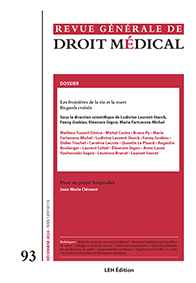0
Panier
0 €

L’interdiction de la procréation post mortem : chronique d’une mort annoncée
Citer cet ouvrage :
Brunet Laurence, L’interdiction de la procréation post mortem : chronique d’une mort annoncée ,RGDM, n°93, 2024, p.123-129
Exporter vers RIS
Télécharge un fichier pour utilisation dans EasyBib, Mendeley, Zotero, etc.
EXPORTER vers RIS
Télécharge un fichier pour utilisation dans EasyBib, Mendeley, Zotero, etc.
EXPORTER vers RIS


